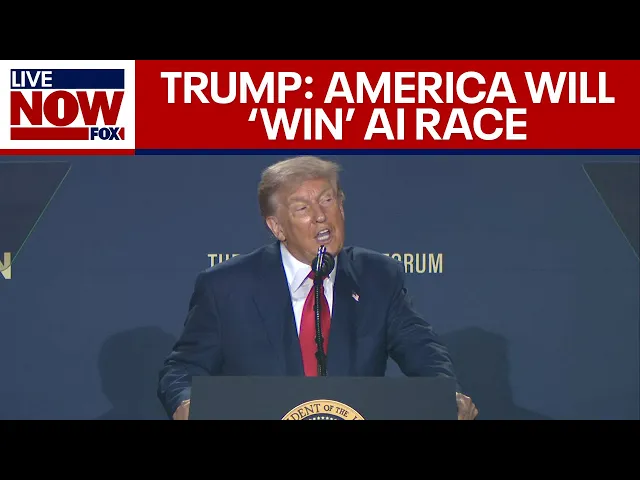FULL: Trump speaks at AI summit, signs executive orders

Trump's AI actions impact tech regulation
In a significant move signaling the growing importance of artificial intelligence in national policy, former President Donald Trump recently addressed an AI summit and signed executive orders related to AI governance. The appearance marks a clear effort to establish his technology policy credentials ahead of the upcoming election cycle, particularly in an area that has rapidly become central to both economic and national security discussions.
Trump's approach to AI reveals an interesting tension in Republican technology policy—balancing innovation with concerns about foreign influence and security. While traditionally advocating for lighter regulatory touches across industries, his executive orders suggest a more nuanced stance when it comes to this transformative technology.
- Trump's executive orders focus on preventing foreign entities, particularly China, from accessing sensitive American AI technology and infrastructure
- The measures aim to restrict foreign investment in AI companies that could potentially compromise national security interests
- There's explicit concern about maintaining American competitive advantage in AI development, with Trump framing it as an economic and security imperative
The most significant takeaway from Trump's AI summit appearance is his attempt to position stringent AI controls as compatible with his broader deregulatory stance. Rather than viewing these measures as contradictory, Trump presents them as necessary protections for American innovation—a framing that allows him to maintain his business-friendly credentials while addressing genuine security concerns about foreign technology influence.
This matters tremendously in our current context because AI regulation sits at a precarious intersection of competing priorities. On one hand, American technology companies want minimal restrictions to maintain their competitive edge and innovation speed. On the other, national security experts increasingly warn about vulnerabilities created when foreign entities gain access to advanced AI systems and their underlying training data. Trump's approach suggests that even traditionally regulation-skeptical politicians recognize some guardrails are necessary in this domain.
Looking beyond what was covered in the summit, it's worth noting how this approach differs from the current administration's AI strategy. President Biden's Executive Order on AI, signed in October 2023, took a broader approach focused on safety, security, and rights protections. While it addressed some similar national security concerns, it placed greater emphasis on establishing safety standards and preventing algorithmic discrimination. Trump's focus appears more narrowly targeted at foreign influence, particularly from China, reflecting his administration's consistent emphasis on economic competition with Beijing.
The contrasting approaches reveal different philosophical frameworks for AI governance. The Biden administration has pursued a comprehensive regulatory approach
Recent Videos
How To Earn MONEY With Images (No Bullsh*t)
Smart earnings from your image collection In today's digital economy, passive income streams have become increasingly accessible to creators with various skill sets. A recent YouTube video cuts through the hype to explore legitimate ways photographers, designers, and even casual smartphone users can monetize their image collections. The strategies outlined don't rely on unrealistic promises or complicated schemes—instead, they focus on established marketplaces with proven revenue potential for image creators. Key Points Stock photography platforms like Shutterstock, Adobe Stock, and Getty Images remain viable income sources when you understand their specific requirements and optimize your submissions accordingly. Specialized marketplaces focusing...
Oct 3, 2025New SHAPE SHIFTING AI Robot Is Freaking People Out
Liquid robots will change everything In the quiet labs of Carnegie Mellon University, scientists have created something that feels plucked from science fiction—a magnetic slime robot that can transform between liquid and solid states, slipping through tight spaces before reassembling on the other side. This technology, showcased in a recent YouTube video, represents a significant leap beyond traditional robotics into a realm where machines mimic not just animal movements, but their fundamental physical properties. While the internet might be buzzing with dystopian concerns about "shape-shifting terminators," the reality offers far more promising applications that could revolutionize medicine, rescue operations, and...
Oct 3, 2025How To Do Homeless AI Tiktok Trend (Tiktok Homeless AI Tutorial)
AI homeless trend raises ethical concerns In an era where social media trends evolve faster than we can comprehend them, TikTok's "homeless AI" trend has sparked both creative engagement and serious ethical questions. The trend, which involves using AI to transform ordinary photos into images depicting homelessness, has rapidly gained traction across the platform, with creators eagerly jumping on board to showcase their digital transformations. While the technical process is relatively straightforward, the implications of digitally "becoming homeless" for entertainment deserve careful consideration. The video tutorial provides a step-by-step guide on creating these AI-generated images, explaining how users can transform...
